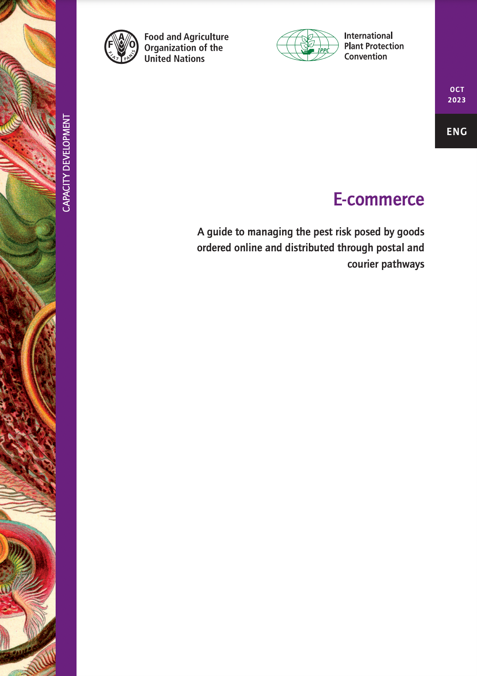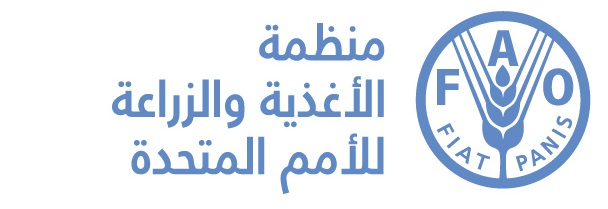SPOTLIGHT: Cultivating compliance and raising awareness on risk of plant pest spread through e-commerce
Posted on أربعاء, 12 يونيو 2024, 12:08

© CFIA
In the dynamic landscape of global trade, the surge of cross-border e-commerce has created numerous opportunities for economic growth, particularly for micro, small, and medium enterprises (MSMEs). However, beneath the surface lies a challenge requiring the global phytosanitary community's attention: the potential spread of plant pests through parcels moving on postal and courier pathways. Creating awareness about the intricacies of phytosanitary compliance in e-commerce is essential for national plant protection organizations (NPPOs) and a vital step in safeguarding global plant health.
Unlike traditional business-to-business (B-2-B) transactions, e-commerce involves business-to-consumer (B-2-C) exchanges of goods. The direct interaction with individual consumers amplifies the risk of non-compliance with phytosanitary import requirements. The challenge thus lies in reaching a vast and diverse audience, ensuring that each participant is well-informed.
NPPOs face multifaceted challenges. Foremost is the sheer volume of e-commerce transactions, resulting in a surge of small parcels moving across international borders. The pressure on inspection, export certification, and risk-based interventions is unprecedented. Sellers and buyers, often unaware of or indifferent to phytosanitary import requirements, contribute to the complexity.
Resources available for NPPOs to create awareness

The International Plant Protection Convention (IPPC) recognizes the challenges posed by e-commerce and together with experts in the plant health community, developed some resources to guide NPPOs in navigating this complex issue.
The IPPC guide titled: E-commerce: A guide to managing the pest risk posed by goods ordered online and distributed through postal and courier pathways addresses the challenges that NPPOs face in regulating the movement of plants, plant products and regulated articles such as agricultural products, ordered online and transported through international postal and courier channels. The guide has a chapter on promoting compliance, several success stories and emphasizes education and communication as key pillars in this IPPC guide's strategy.
Through its Recommendation on Internet trade (e-commerce) in plants and other regulated articles, the Commission on Phytosanitary Measures (CPM) encourages the global plant health community to collaborate with other stakeholders to monitor internet trade and to ensure that goods ordered online comply with relevant phytosanitary regulations on the basis of risk analysis. More resources are available here.
“As one of the development agenda items in the IPPC Strategic Framework 2020-2030, managing the pest risk through e-commerce is a priority for the IPPC community”, said Osama El-Lissy, IPPC Secretary. “It is critical to increase awareness among stakeholders- sellers, buyers, and e-commerce platforms, and therefore foster a well-informed community. This will improve plant health, enhance compliance with international phytosanitary standards, foster food security, protect the environment and facilitate safe trade".
Awareness raising campaigns: a critical tool in helping NPPOs address the risks associated with e-commerce
NPPOs can address and mitigate pest risks associated with e-commerce transactions involving plants, plant products and other regulated articles through various awareness strategies. These include sending letters with information through seized goods or opened parcels, creating an easy-to-use citizen reporting system, and working closely with e-commerce platforms, industry groups, and private-sector organizations to improve outreach and effectiveness. Engaging with internet trade and lobby groups could help increase awareness of phytosanitary import requirements and pest risks and establish strong advocacy and awareness raising mechanisms.
Some countries have applied some of the strategies above with success providing a useful learning opportunity for NPPOs as exemplified by these two success stories from the IPPC E-Commerce guide.
How New Zealand has engaged with online buyers of prohibited plants via social-media groups
New Zealand successfully used educational letters to enhance phytosanitary compliance in relation to the illegal importation of plants, specifically the string of turtles Peperomia prostrata and Rhaphidophora tetrasperma from the United States of America. These plants, which are not listed on the New Zealand Plant Biosecurity Index, were being smuggled with a customs declaration falsely labeling them as a "scarf." Despite arriving "dead," concerns lingered about potential pests and diseases. Prompted by negative Facebook comments, investigators from the NPPO intervened. NPPO investigators issued an educational letter to importers, stressing phytosanitary import requirements, advising contact for quarantine disposal, and requesting information on the plant's origin and the source (exporter/website). Importers expressed remorse after reading this letter.
This example shows the significance of having a well-informed online community that reports suspicious activities related to plant imports. Negative comments and messages from Facebook users helped in prompting corrective actions. It highlights the ongoing need to raise public awareness about the risks posed by unauthorized plant imports, the importance of vigilant online communities, and the role of regulatory authorities in enforcing plant health measures to prevent the unauthorized importation of plants.
How Canada raised awareness through online campaigns
From 2020 to 2021, the Canada NPPO’s awareness-raising campaign targeted online consumers, to address the increased risks associated with e-commerce, (which rose substantially during the COVID-19 pandemic). The NPPO adopted a digital campaign strategy that included paid advertising.

© CFIA
Some key messages of the Campaign were
- "Check before checking out – know the rules and the potential risks before buying online."
- "Just because an item is available for sale online does not mean it is approved to be imported or that it meets Canadian requirements."
- "Some goods could be harmful to Canada’s natural resources and economy."
- "Help ensure import requirements for plants, food, animals, and related products are met."
The campaign, delivered through social media, an e-commerce topic page, articles, and outreach to key partners and stakeholders, made online consumers more aware of import requirements, potential risks, and the importance of compliance. The compliance-promotion campaign targeting online consumers helped to raise their awareness about import requirements for food, plants, and animals.
According to the Canadian plant health community, it was a successful campaign, showing the NPPO's proactive approach in addressing the challenges posed by the surge in e-commerce. It also emphasized the value of digital campaigns in educating online consumers about import requirements and promoting compliance with regulations. As NPPOs set sail in the e-commerce seas, the importance of awareness creation among the various players in e-commerce becomes paramount.
Related information:

